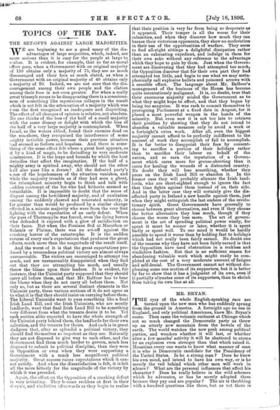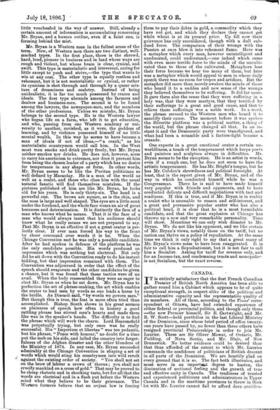MR, BRYAN.
THE eyes of the whole English-speaking race are turned upon the new man who has suddenly sprung from the ground in America. A fortnight ago no one in England, and only political Americans, knew Mr. Bryan's name. Then came the volcanic outburst at Chicago which not so much changed the Democratic party as threw up an utterly new mountain from the bowels of the earth. The world watches the new peak among political parties, and wonders whether it will last, or whether after a few months' activity it will be shattered to atoms by an explosion even stronger than that which raised it. Meantime every one wants to know what manner of man it is who is Democratic candidate for the Presidency of the United States. Is he a strong man ? Does he know his own mind, and intend to have his own way, or is he merely the veil behind which other men will work in silence ? What are the personal influences that affect his character ? Does he really believe in the wild schemes which he advocates, or has he merely adopted them because they pay and are popular ? The air is throbbing with a hundred questions like these, but as yet there is little vouchsafed in the way of answer. Still, already a certain amount of information is accumulating concerning Mr. Bryan, and a human outline, even if a faint one, is forming behind the mist.
Mr. Bryan is a Western man in the fullest sense of the term. Now, of Western men there are two distinct, well- marked types. In the first place, there is the shrewd, hard, loud, pioneer in business and in land whose ways are rough and violent, but whose brain is clear, cynical, and swift. This type is materialistic and irreverent, caring for little except to push and strive,—the type that wants to win at any cost. The other type is equally restless and vehement, but it is not materialistic or cynical, or rather its cynicism is shot through and through by a queer mix- ture of dreaminess and. zealotry. Instead of being unidealistic, it is far too much possessed by crazes and ideals. The first type abounds among the farmers and dealers and business-men. The second is to be found among the lawyers, the newspaper-men, and the members of the other professions. Unless we mistake, Mr. Bryan belongs to the second type. He is the Western lawyer who began life on a farm, who left it to get education, and who, passing from one Western academy or uni- versity to another, ravished, as it were, the goddess of learning, and by violence possessed himself of no little mental wealth. In this way he seems to have become a man of ideals if not of ideas,—" a crank," as his materialistic countrymen would call him. In the West most men smoke and drink pretty freely, but Mr. Bryan neither smokes nor drinks. He does not, however, seem to carry his asceticism to extremes, nor does it prevent him from being the chosen leader of a party which has no desire for temperance in any shape or form. In other words, Mr. Bryan seems to be like the Puritan politicians so well defined by Macaulay. He is a man of the world as well as a zealot, and those who class him with the usual teetotal fanatic will find themselves mistaken. If the pictures published of him are like Mr. Bryan, he looks old for his years. He is only thirty-six. The head. is a powerful one. The brows are square, as is the chin, and the nose is large and. well shaped. The eyes are a little sunk under the forehead, and the whole face wears an air of great keenness and determination. It is distinctly the face of a man who knows what he means. That it is the face of a man who would always insist that his audience should know what he really means we are not prepared to say. That Mr. Bryan is an effective if not a great orator is per- fectly clear. If ever man forced his way to the front by sheer command over words it is he. When the Chicago Convention met he was only a possible candidate. Alter he had spoken in defence of the platform he was the only candidate possible. His words produced an impression which was nothing but electrical. Not only did he sit down with the Convention ready to do his instant bidding, but that impression remained with them. The Convention was adjourned in order that the effect of the speech should evaporate and the other candidates be given a chance, but it was found that these tactics were of no avail. When the body reassembled they were as eager to elect Mr. Bryan as when he sat down. Mr. Bryan has to perfection the art of phrase-making, the art which enables the orator to lead men by words as one leads a horse by the bridle. As Disraeli said, "by words we govern men." But though this is true, the feat is more often tried than accomplished. Bishop South shows in his great sermon on plainness of speech how often in history a good rattling phrase has stirred men's hearts and made them like wax in the speaker's hands. The difficulty is to find the phrase which will work the charm. Lord Beaconsfield was perpetually trying, but only once was he really successful. His " Imperium et libertas " was too pedantic, but his phrase, "Peace with honour," no doubt for a time put the mob on his side, and lulled the country into forget- fulness of the Afghan disaster and the other blunders of the Ministry of 1874. In any case, Mr. Bryan succeeded admirably at the Chicago Convention in shaping a set of words which would sting his countrymen into wild revolt against the existing order of society. "You shall not set on the brow of labour a crown of thorns ; you shall not crucify mankind on a cross of gold." That may be proved to be cheap rhetoric and in shocking taste, but for all that the words are electrical and in a flash put before the Western mind what they believe to be their grievance. The Weetern farmers believe that an unjust law is forcing them to pay their debts in gold, a commodity which they have not got, and which they declare they cannot get while wheat is at its present price. Up till now their grievance has only smouldered, though with a dull sub- dued force. The comparison of their wrongs with the Passion at once blew it into vehement flame. Here was a metaphor which every man, however unintelligent and uneducated, could understand,—one indeed which came with even more terrific force to the minds of the unculti- vated than to those of the cultivated. Metaphors lose their force because we hear too many of them, but here was a metaphor which would appeal to men in whose daily speech there was no room for tropes and artifices. But the metaphor did more than merely awaken the minds of those who heard it to a sudden and new sense of the wrongs they believed themselves to be suffering. It did far more. It gave them also the sense that they were suffering in a, holy war, that they were martyrs, that they testified by their sufferings to a great and good cause, and that to relieve these sufferings was a noble work. In a word, the phrase seemed to the Western men who heard it to sanctify their cause. The moment before it was spoken the Silverite platform was a political matter, a thing of the world, but the phrase changed all that. In an in- stant it and the Democratic party were transfigured, and what had been a scramble and a faction-fight became a. crusade.
One expects in a great emotional orator a certain un- worldliness, a touch of the temperament which keeps poets and painters and sculptors always in difficulties. Mr. Bryan seems to be the exception. He is an artist in words, even if a rough one, but he does not seem to have the artistic temperament. He has Mr. Bright's tongue, but he has Mr. Cobden's shrewdness and political foresight. At least, that is the report given of Mr. Bryan, and of the way in which be conducted himself while he was a Congressman. There he is said to have made himself very popular with friends and opponents, and to have conducted delicate and difficult negotiations with tact and readiness. If this is true, and if Mr. Bryan is in reality a zealot who is amenable to reason and self-interest, and a great and persuasive popular orator who has also a political head, it is clear that he is a most formidable candidate, and that the great explosion at Chicago has thrown up a new and very remarkable personality. Time will show. Meantime we can only wish disaster to Mr. Bryan. We do not like his opponent, and we like certain of Mr. Bryan's views, notably those on the tariff, but no nation can thrive on a policy of repudiation. At the same time we think it only right to say that a great many of Mr. Bryan's views seem to have been exaggerated. It is fair to call him a Repudiationist, but it is not fair to call him a Socialist. Asking for tariff for revenue only, and for an Income-tax, and condemning trusts and monopoliee is not Socialism, but the exact reverse.



































 Previous page
Previous page